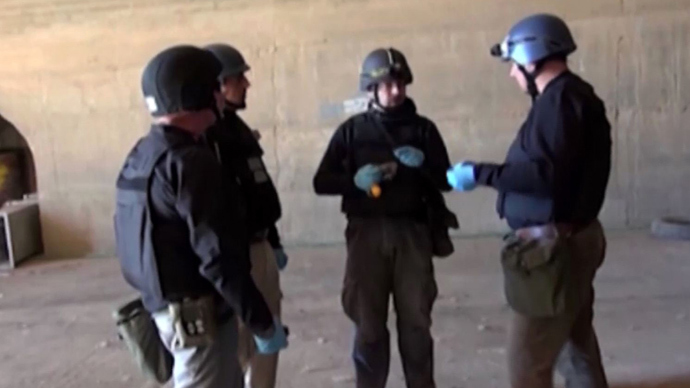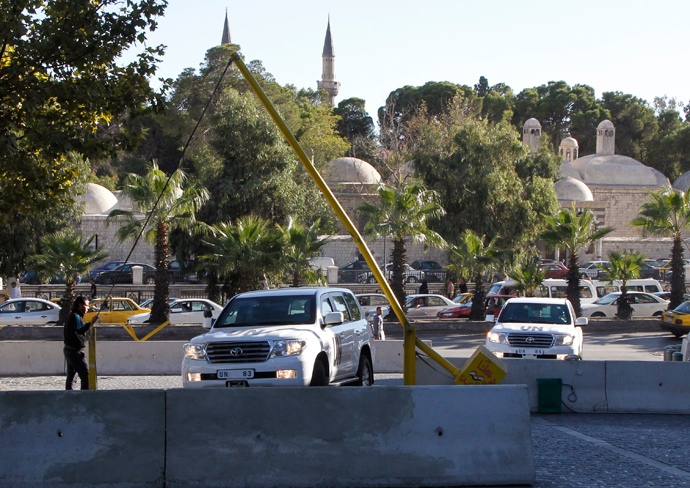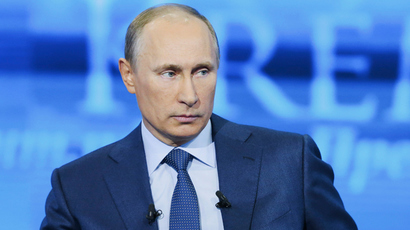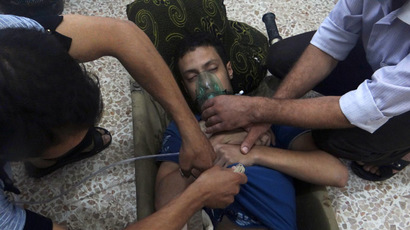Global chemical weapons watchdog wins Nobel Peace Prize

The organization responsible for destroying stockpiles of chemical weapons in Syria has received this year’s Nobel Peace Prize for ‘extensive efforts to eliminate chemical weapons’, the Nobel Committee announced in Oslo.
The Organization for the Prohibition of Chemical Weapons (OPCW)
was founded in 1997 to enforce the Chemical Weapons Convention,
an international treaty that bans the production, storage and use
of chemical weapons.
Its main job since then has been the ongoing monitoring of the
process of chemical disarmament by the treaty’s signatories,
particularly the US and Russia, the countries that held the
largest stockpiles at the time it was signed.
The watchdog recently attracted headlines after a Russia-brokered
deal with Syria, which agreed to join the convention and
dismantle its chemical weapons arsenal.
“The conventions and the work of the OPCW have defined the use of chemical weapons as a taboo under international law. Recent events in Syria, where chemical weapons have again been put to use, have underlined the need to enhance the efforts to do away with such weapons,” the Norwegian Nobel Committee said in a statement.
“Some states are still not members of the OPCW. Certain states have not observed the deadline, which was April 2012, for destroying their chemical weapons. This applies especially to the USA and Russia,” it added.
The present situation opens a historic chance for humanity on the path towards disarmament, Thorbjoern Jagland, the head of the Nobel Peace Prize committee, said as he announced this year’s laureate.
"We now have the opportunity to get rid of an entire category of weapons of mass destruction...That would be a great event in history if we could achieve that," he said.

OPCW inspectors are currently on the ground in Syria, supervising the destruction of the country’s estimated 1,000 tons of chemical arms stockpiles.
The task would not be easy in a country engulfed by a two-and-a-half-year war. The current roadmap indicates Syria should be left without chemical weapons capability by mid-2014.
The OPCW team currently working in Syria consists of 27 field experts, with the number expected to rise to roughly 100 by the time the dismantling is in full swing.
The organization said Syrian authorities are ‘quite cooperative’ with them, but the inspectors may find it difficult to access the sites or their interest, which are currently located in rebel-held areas. The sites are presumed to have been emptied from all chemical weapons and related equipment, but the experts needs to ensure that.
Destruction of production equipment and weapons-filling systems for the Syrian chemical weapons is underway and is expected to be completed by November. Destroying the chemicals themselves is a more labor-intensive and risky job. The best approach to the task is still under discussion.
The resolution of a stand-off between Syria and the US – the latter of which threatened to attack the Middle-Eastern country for alleged use of chemical weapons against rebel forces - through Syria’s joining the prohibition treaty is viewed by many as a major achievement for the cause of peace.
Russia’s President Vladimir Putin was nominated for a Nobel Peace Prize for his role in brokering the deal, but the application came too late to be considered this year and was pushed to 2014.
The decision of the Nobel committee received a mixed reaction in Russia. The head of the State Duma Foreign Affairs Committee Aleksey Pushkov blasted it, saying the Nobel Peace Prize is becoming a down payment for deeds yet to come.
“First there was Obama – for speaking smoothly; now it’s OPCW, which just started its work in Syria,” he tweeted.
His fellow MP Vyacheslav Nikonov praised the choice in an Itar-Tass interview, calling it “one of the most balanced and thought-out decisions in the history of the [Nobel] Committee,” which “in any case raises the least number of questions.”
Awarding the prominent prize to the OCPW came as a surprise to many. Nobel Prize watchers didn’t mention the organization as a likely laureate. Predictions favored several individuals, including Malala Yousafzai, a teenage Pakistani women’s rights campaigner who survived a Taliban attack, Dr. Denis Mukwege, a gynecologist and rape victims’ defender from Congo, Claudia Paz y Paz, the resilient mafia-fighting Guatemalan attorney general, and Sister Mary Tarcisia Lokot, a nun at the forefront of post-war reconciliation in Uganda.
The Committee’s choice was predicted about an hour before the official statement by the Norwegian public broadcaster NRK.
NRK has a strong track record of reporting winners. Last year it was correct predicting that the EU would win about an hour before the official statement.














